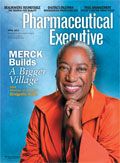Conflicted Interest
Pharmaceutical Executive
Do Big Pharma dollars make physicians lousy caregivers?
Money is both a "visible divinity" and a "common whore," capable of a "universal confounding and distorting of things," wrote Karl Marx, cherry-picking Shakespeare. Of course, the impecunious Bard himself relied on a number of well-heeled patrons—including Queen Elizabeth I and King James I—and the content of his plays reflects that support. It's hard to argue, though, that Shakespeare slipped very far into anybody's pocket.

Ben Comer
But to what extent does pharma's payment for services, or outright patronage of physicians, influence the art of medicine? It's difficult to say in most circumstances, but it's impossible to say when those payments aren't transparent and readily available for scrutiny by patients and the public at large. ProPublica's Dollars for Docs project, updated for the third time in March, aims to aggregate and freely disseminate all available data on the payments pharma makes to physicians. "Our mission was to make this information easily accessible to the public, as we started seeing pharmaceutical companies disclosing [payments to physicians] under their corporate integrity agreements," Charles Ornstein, senior reporter for ProPublica, told Pharm Exec.
One objection industry has voiced regarding ProPublica's project is that "the information doesn't have the appropriate context, and how are patients supposed to use this?" says Ornstein. "Our response to that is, this is exactly the information that the pharmaceutical companies have put on their websites—their specific definitions of the categories, etc. To the extent [pharma] thinks more information about what each physician does would be useful to the public understanding, we encourage them to release that information."
What do patients think? Ornstein says the overwhelming number of hits the Dollars for Docs database is receiving proves that patients are taking an interest. "They're looking their doctors up, and sharing on social media what they're finding." Dollars for Docs does not intend to "breed distrust between patients and doctors," says Ornstein. Rather, the intent is to "stimulate conversation, and to the extent that patients have questions about their doctors, to help them understand these relationships."
Our survey says...
Will that interest and conversation lead patients to reexamine their own relationships with individual physicians? As part of its third update to Dollars for Docs, ProPublica created a list of 22 "top earners," or physicians that received the most money for speaking and consulting on behalf of pharma; compensation for travel, meals, research, and other categories was excluded. To find out how these physicians are currently viewed by their patients, Pharm Exec cross-checked all 22 names with Healthgrades, a popular online physician ratings service.
Healthgrades asks patients to grade physicians on office environment, appointment scheduling, and wait time, but more significantly, patients are asked four key questions:
» How much trust a patient feels for the physician
» How well the physician helps them understand their condition
» Whether the physician listens and answers questions sufficiently
» How much time is spent with the patient.
The final survey question Healthgrades poses is: Would you recommend this physician to family and friends?
Of the 22 top-earning docs—all of whom received over half a million dollars each from pharma since 2009—12 had three or more patient surveys completed on Healthgrades. Of those 12, six performed above the national average on the four questions listed above, five performed below the national average, and one was exactly average. On the question of whether a patient would recommend the physician to family and friends, patients said yes on average for the same 12 physicians; the national average on this question is slightly above "mostly yes," but slightly below "definitely yes." Only three docs ranked above the national average on this question, and seven ranked below. Two hit the national average exactly.
It's a wash
What conclusions can be drawn from the Healthgrades data? More patient surveys are needed, but apparently the physicians paid the most by pharma are more or less average practitioners, from their patients' perspectives; capable enough, but not outstanding.
With the Sunshine Act set to bring even more payment data into the public realm, patients will have to decide for themselves whether pharma dollars confound and distort the care they receive, and how much money is too much. And physicians will have to decide what level of pharma patronage they're willing to accept without jeopardizing their reputation with patients, or endangering the purity of their practices.

Ben Comer is Pharm Exec's Senior Editor. He can be reached at bcomer@advanstar.com.

Addressing Disparities in Psoriasis Trials: Takeda's Strategies for Inclusivity in Clinical Research
April 14th 2025LaShell Robinson, Head of Global Feasibility and Trial Equity at Takeda, speaks about the company's strategies to engage patients in underrepresented populations in its phase III psoriasis trials.
Beyond the Prescription: Pharma's Role in Digital Health Conversations
April 1st 2025Join us for an insightful conversation with Jennifer Harakal, Head of Regulatory Affairs at Canopy Life Sciences, as we unpack the evolving intersection of social media and healthcare decisions. Discover how pharmaceutical companies can navigate regulatory challenges while meaningfully engaging with consumers in digital spaces. Jennifer shares expert strategies for responsible marketing, working with influencers, and creating educational content that bridges the gap between patients and healthcare providers. A must-listen for pharma marketers looking to build trust and compliance in today's social media landscape.
Pfizer, GSK Gain ACIP Recommendations for RSV and Meningococcal Vaccines
April 18th 2025The Centers for Disease Control and Prevention’s Advisory Committee on Immunization Practices voted to expand access to Pfizer’s respiratory syncytial virus vaccine Abrysvo for high-risk adults in their 50s and voted in favor of GSK’s meningococcal vaccine, Penmenvy, for streamlined adolescent protection.